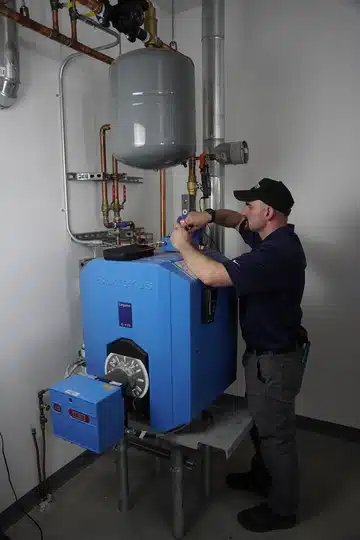
In most households, the availability of warm, running water is crucial to everyday living. From baths, showers, and regular handwashing to cooking, dish-cleaning, and laundry, the average person could end up using water of varying warmth up to 20 times daily. Multiplying this usage by each family member brings the demands placed on the water heater to perspective.
Sooner or later, you are bound to notice signs that it is time to replace your water heater. Whether it is due to usage strain or the age of the water heater tank, water heaters, even the best quality, have a lifespan of roughly 10 years. You can help prolong the life of your water heater with annual maintenance. However, chances are you will need to replace the pre-existing water heater tank with a new one if you occupy a given residence for more than eight years.
Thus, as a homeowner, when do we decide on the replacement of water heaters? Well, this blog seeks to discuss the signs that would indicate when you should replace your water heater.
When do we decide on a replacement for water heaters?
· The water heater is too old
No electrical appliance lasts forever including water heaters. During your average home occupancy, you are bound to face that moment where you need to replace your water heater. Trouble is, that you may not be aware when your water heater reaches its expiration date. Failure to know this can result in major risks when your water heater starts acting up due to old age.
· Rusty water or heater inlet valve
Despite being the strongest material on the face of the earth, steel has its weakness: rust or corrosion. When rust takes hold of a steel surface, it slowly spreads and eats through the steel in particular spots. Corrosion serves as the warning sign of oncoming leaks on tanks and water pipes made of steel. It is often difficult to identify whether the rust is coming from your water heater or the pipes leading to your faucet. Regardless, rust is an immediate issue that should be rectified for the sanitation of your household.
Rusty water: when corrosion appears in the hot water from your sink’s or bathtub’s faucets, you likely have a rusty water heater. Corrosion is inevitable on water heaters used past their expiration date.
Rusty valve or inlet: if you notice rust around the water inlet or pressure relief valve on the heater, rust has likely taken hold of the inside of the tank. Therefore, you should consider replacing your tank as soon as possible.
Rusty pipes: if you have a galvanized piping system, rust could form on the insides with age, and the issue could become so intense that it is noticeable in sinks and tubs. An efficient way to determine if rust is originating from your pipes is to drain several buckets of hot water from the tank.
· Water heater noise
Another sign of a failing water heater is the noise from the water tank. As your water heater ages, rumbling noises will start emanating louder and louder as the tank heats the water. If you consume large amounts of hot water, the issue is likely to be even more pronounced once the cause takes hold. Water heater noise is mainly caused by sediment buildup which is an indicator that your water heater tank will eventually leak.
As your aging hot water tank continually heats and reheats water, sediment starts forming on the bottom of the tank. Over time, the sediment hardens and grows thicker. Sediment can rapidly wear a hot water tank and cause inefficiency and accelerated damage. To prevent damage from sediment buildup, flush your water heater annually. This will drain the sediment from the tank enabling it to work more efficiently. With an annual tank flush, your hot water tank will probably last its full life span. Also, it is crucial to have a professional plumber conduct the flushing.
· Leaking water heater tank
As your water heater approaches the end of its life span, there is an increased likelihood that you will see a water leak. Depending on where your water heater is located inside the house, a leak could cause significant property damage. Thus, the most serious issue that could ever happen would be a serious leak with your water heater.
Water leaks are often caused by expansions to the metal in the tank. These expansions occur over time as the tank’s inner body is exposed to several heating cycles. When a fracture initially forms, the gap is likely slight enough to hold water.
Thus, when the water heater tank is idle, there will be no water leak. However, when the metal expands at each heating cycle, there is bound to be small amounts of leaking water.
· Water heating not working
Warm and hot water are among the most essential household necessities. Without warm water, you cannot take showers, wash your hands, clean dishes, or run the laundry machine. Many residents disregard warm water and are hence set off balance whenever water from the bathtub or sink fails to reach sufficient warmth.
Related Article: What are the top 3 reasons in choosing the best plumbing and heating services
What causes loss of heat in water heaters?
Heat loss in your water supply is likely caused by a broken heating element, misadjusted thermostat, or a tank that is too small for the size of your house.
· Broken heating element
If cold water pours from your sink or bathtub faucets, the problem could stem from a broken heating element in your water heater. Simply contact your local plumber to get the necessary repairs and have the heating functions restored within hours.
· Thermostat adjustment
If the water from your faucet fails to reach adequate heat levels, the issue could be down to a problem with the electrical thermostat. To ensure sufficient gets to your household water system, ensure the thermostat settings read between 120° and 140°.
For an electric water heater, connect the power and reset the thermostat. Flush the heater to remove sediment. Insulate the hot water pipes and have the thermostat replaced. Raise its temperature setting. A gas water heater uses the same procedure but you need to ensure the pilot light is lit.
· Insufficient tank size
The likeliest correlation between water heat loss and the need for water heater replacement comes when you get too full for the water heater tank. If there are more family members in your house now than there were a while back, the demands of your house could exceed the limits of your pre-existing water heater. Therefore, you need to replace your water heater with something equipped to meet the size and usage demands of your current household like a larger tank.
At what age should you replace a water heater?
Most water heaters last between 8 – 10 years. While a decade is an age at which water heater replacement is generally recommended, the actual need to replace a water heater could arise before or after this timeline. Whether or not your water heater starts showing signs, you should replace it once ten years have passed from its manufacturing date. To know the age of your water heater, check the serial number listed on the manufacturer’s sticker. However, the serial number does not list the date in a ready format.
Nonetheless, not all hot water heaters have a life expectancy of up to a decade. The main exception is gas water heaters, which generally only last between 6 – 8 years. Therefore, if your residential occupancy ranges between 7 – 8 years, then you will be likely responsible for the water heater replacement if it is a gas water heater or has a gas burner.
What is the life expectancy of a water heater?
Depending on a manufacturer’s recommended service life, the life expectancy of a water heater ranges from 8-12 years. This varies with the design and location of the unit, maintenance schedule, quality of installation, and water quality. If your water heater is more than a decade old, leaks around its base, or if it works disconnectedly, you should probably replace it. Additionally, you may opt to upgrade to a more energy-efficient model to minimize your energy expenses.
In some instances, repairs and troubleshooting can save your existing hot water tank. Before looking for a replacement, ensure that an electric issue like a tripped breaker or blown fuse is not the cause of the unit failing. Maintaining your unit regularly will extend its lifespan and some repairs are pretty simple – such as replacing the heating element or a leaking pressure relief valve.
Is it worth replacing the water heater?
Like most homeowners, you rarely think much about your water heater. Even if you do, you do not want to deal with the hassle of replacing it. However, installing a new unit in your home could benefit you immensely, especially if your current one is old or outdated.
· Cost. Tank water heaters cost cheaper than tankless water heaters. Thus, they are an affordable option for homeowners.
· Performance. A tank water heater often has a supply of heated water on standby for use. Therefore, you can expect quick hot water delivery to your taps.
· Efficiency. A new water heater tank offers great heating efficiency. Modern tanks are much more efficient than before. Therefore, standby energy loss is no longer a concern. Additionally, you can boost efficiency even more by insulating the tank and water lines.
· Hot water recovery rate. An old water heater tank may experience issues replenishing hot water at a sufficient rate. Thus, you may find yourself taking a cold shower if you enter the bathroom after your family members. A new water heater tank can remedy this problem as it can replenish hot water at a rate that meets your entire family’s demands.
If you are replacing a water heater, have it replaced with the same type of unit.
Contact Prospector Plumbing and Heating for water heater replacement
Water is one of the most used resources in each household. In most of these daily utilities, water is needed with some degree of warmth. Thus, when your water heater fails for whatever reason, the problem must be rectified immediately to ascertain the comfort of each family member. Seek professional opinion from the Prospector Plumbing and Heating experts if you need to replace your water heater. Our service crews are available to repair and replace heating units of different sizes and models. If you notice any signs that your water heater needs to be replaced, contact us today at 907-312-2598 for professional water heater replacement or repairs.

